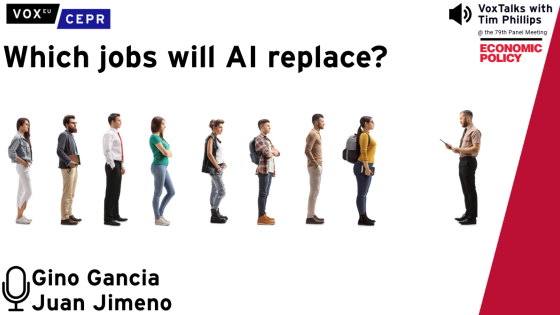It is widely agreed (at least among economists) that there are likely to be substantial efficiency and equity gains globally from freer international migration. As Clemens (2011) puts it, there are “trillion-dollar bills on the sidewalk”, Yet freer international migration is not a very popular idea; indeed, some people are extremely hostile to it.
In a new paper we point out that restrictions on international migration generate a missing market in work permits (WPs), with important policy implications (Lokshin and Ravallion 2019). In a nutshell, our policy idea is to create a market that helps capture the gains from international economic migration, while keeping the host government in control of domestic employment. An anonymous market exchange would allow working-age citizens to rent out their right-to-work (RTW). (There is much they could then do, including financing education or training, homecare of loved ones, or taking a long vacation.) Simultaneously, someone else would pay for a WP and would then be free to take up any job offer in that country, if admitted by other criteria deemed relevant. If the option of selling your RTW is confined to those in the workforce then aggregate labour supply would stay the same. A broader base of eligibility would allow rising employment.
The market prices of these new WPs would be conditional on the stipulated length of time and start date. Once that period ends, the seller gets back her RTW. The marketable WP would fully disembodied from the person selling it, and also independent of who is buying it. The market is anonymous.
The currently missing market would no longer be missing. This can be seen as a social protection policy as well as an efficient policy for managing immigration. And freer international migration would surely become a more popular idea – relieving public concerns by helping to internalise the externalities in host countries generated by migrants (or at least perceived to be).
There have been past policy proposals with broadly similar aims. Becker and Lazear (2013) proposed that the US government should sell citizenship rights to foreigners, rather than requiring quotas and long queues. The revenue from selling work permits has also been seen as a means of compensating those native workers who are vulnerable to competition from migrant workers (as in Weinstein 2002).
These past proposals for selling citizenship or WPs have been incomplete in an important respect: they have not eliminated the underlying market failure. Alongside the current excess demand for WPs, there is a potentially large supply side, namely, all those workers in high-wage economies who would be happy to rent out their right to take up work when offered it as long as they are adequately compensated. Our proposal accommodates both the supply and demand sides of the missing market for WPs.
Some observers have proposed instead treating migrants differently to citizens as a means of making migration more popular in the host country. One can impose higher taxes on migrants, or one can discriminate against migrants in other ways, such as in restricting their rights. Something like the latter exists already; typically, migrants do not have the same rights as citizens. Objections are often raised to how migrant workers are treated, though this has been seen as a necessary evil to assuring freer migration. But the objections remain. Our proposal does not require any form of discrimination against migrants.
The proposal also has advantages over sponsorship schemes, such as proposed by Posner and Weyl (2008), whereby an individual citizen can sponsor a visa for a specific migrant, and the citizen and migrant share in the earnings gain realized by migration. One difference is that we do not require sponsorship. The transactions involved are anonymous – there is no contact between the parties involved – which would reduce the transaction costs of sponsorship schemes, such as in finding each other and in negotiating and sharing in the gains from migration. Another difference is that our proposal need not increase aggregate labour supply in the host country. The government would retain the option of using migration to expand employment, but that is not intrinsic to the proposal. Most importantly, by its lower transaction costs, our proposal will come closer to eliminating the market failure and so assure larger welfare gains.
Implementation
One way to implement this proposal is to create a web-platform for online double auctions of WPs – a natural analogue to the economic model of a competitive market for WPs that we outline in the paper. This would be managed by the government of the host country, which retains its monopoly over the supply of WPs. A separate bank account would be maintained for deposits and withdrawals associated with the new market.
The government (acting as auctioneer) first announces a discrete schedule of WPs, each stipulating a start date and duration. (The durations could be bounded by the host country’s existing practice for issuing WPs.) A citizen would register on the site, go through background checks, and provide some documents that verify eligibility to trade on the site (for example, to verify age). Once cleared, a citizen submits an offer to sell one (or more) of the WPs, with a stipulated duration and start date. The potential seller provides a minimum acceptable asking price. At the same time, potential buyers submit their maximum bids.
The canned software then finds the market clearing price ω for each WP such that the counts on the two sides of the market are in balance (at least approximately; some local averaging may be required). Under regular conditions, a unique price, or range of prices, will exist. The equilibrium price schedule is then announced. All those citizens who said they are willing to sell their RTW for at least ω will take the offer, while a similar number of people wanting a WP but willing to pay no more than ω (plus stipulated taxes and charges) take it up. It is the responsibility of the buyer to provide the full bid amount to complete the transaction. Once bought, the WP cannot be resold.
There are other ways one might implement this idea, including in a form similar to the popular auction site eBay. The paper discusses implementation options and issues further.
Benefits to the host country
The host country will benefit in several ways. Relatively low productivity workers who currently have little option but to join the labour market would probably be replaced with high productivity workers, raising GDP and tax revenues. The former workers would have new opportunities, including raising future returns in the labour market or taking up self-employment activities. The scheme can be designed to avoid changing the total employment in the host country. Our proposal also avoids the need to discriminate against migrants by extra taxation or diminished rights – avoiding the trade-off between migrant welfare and freer migration.
There would be important complementarities with social protection goals. As a social protection policy this would have some attractive features. Like a Universal Basic Income (UBI), our proposal provides a new income source for people who presently have little or no option but to work and in doing so must forgo personally and socially valuable pursuits. Like a UBI, there is no explicit targeting mechanism; since our proposal relies on a competitive market mechanism, everyone (rich or poor) has this new opportunity and everyone faces the same price schedule for renting out their RTW. Thus, like a UBI, our proposal can be expected to have broader appeal, and be more sustainable politically, than finely targeted transfers.
There are some important differences. Our proposal will probably have a more pro-poor incidence than a UBI; specifically, it will bring both direct (first-order) gains to poor people who take up the option of renting out their RTW – a ‘self-targeting’ mechanism – and indirect gains to others via the likely tightening in the low-wage labour market. UBI has been advocated as a means of addressing job-loss due to automation. But why would one give the transfer to everyone, including those who stay working? Our scheme would directly help those who lose their job due to automation. Also, unlike a UBI, it is self-financing. This overcomes a widespread concern about UBI proposals that require higher domestic taxes or are only available as an option to existing welfare programmes, thus reducing the net gains to poor people from the UBI.
Possibly the most important benefit from our proposal is in reducing poverty and inequality in host countries. Under certain conditions, this policy would create a binding floor on incomes in the host country. Workers there will tend to sell their RTW if they earn less than the going ω, while foreign workers will only take up migration if they earn something more than ω (sufficiently more to cover costs of moving and any tax levied). Thus, our proposal can be thought of a new way of providing a guaranteed minimum income.
Conclusions
Whenever a market is missing there are potential welfare gains from creating that market. It does not seem too difficult to create a competitive market in work permits, with both a supply and demand side. By eliminating the current market failure – generated by restrictions on international economic migration – our proposal would yield economic and social benefits in the host country, as well as first-order welfare gains to people in low-wage economies.
References
Becker, G S, and E P Lazear (2013), “A Market Solution to Immigration Reform”, Wall Street Journal, March 1.
Clemens, M A (2011), “Economics and Emigration: Trillion-Dollar Bills on the Sidewalk?”, Journal of Economic Perspectives 25(3): 83–106.
Lokshin, M and M Ravallion (2019), “The Missing Market for Work Permits”, Policy Research Working Paper 9005, World Bank.
Posner, E and G Weyl (2008), Radical Markets: Uprooting Capitalism and Democracy for a Just Society, Princeton: Princeton University Press.
Weinstein, E (2002), “Migration for the Benefit of all: Towards a new Paradigm for Economic Immigration,” International Labour Review 141(3): 225-252.




